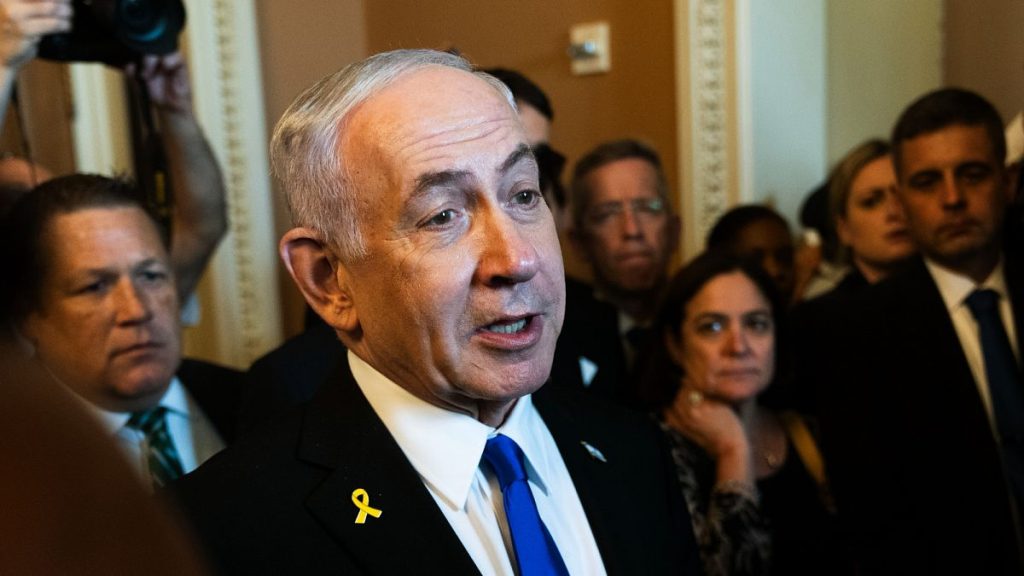Israeli Prime Minister Benjamin Netanyahu is facing significant political challenges as a key governing partner, the ultra-Orthodox party Shas, announced its departure from his coalition. This move leaves Netanyahu’s government with a minority in parliament, raising questions about its stability amid pressing national issues. Despite this setback, Shas indicated that it would not fully undermine the coalition, potentially allowing for continued legislative action in the near future.
| Article Subheadings |
|---|
| 1) Political Fallout from Resignation |
| 2) The Role of Ultra-Orthodox Parties |
| 3) Implications for Israeli Politics |
| 4) Military Draft Controversy |
| 5) Next Steps for Netanyahu |
Political Fallout from Resignation
The announcement from Shas that it would leave the coalition came as a major jolt for Benjamin Netanyahu, who has long relied on this party’s support to maintain a governing majority. Shas, which has historically acted as a kingmaker in Israeli politics, articulated that their decision stemmed from unresolved disputes regarding a proposed law that would secure military draft exemptions for their constituents. In the political landscape, such resignations often prompt a re-evaluation of alliances and strategies, particularly in a government with a slim parliamentary margin. Currently, Netanyahu’s coalition will consist of just 50 seats in the 120-seat parliament following the resignation notice, amplifying the challenges he faces in executing his legislative agenda.
The Role of Ultra-Orthodox Parties
Ultra-Orthodox parties have historically been crucial to the political landscape in Israel, often forming pivotal coalitions to achieve legislative goals. The decision by Shas is not an isolated incident; it follows a similar announcement from the United Torah Judaism party earlier in the week regarding their exit. Both parties were pushing for the passing of a law addressing military draft exemptions, a contentious issue that resonates deeply within their communities. As they retreat from governance, the rift between these parties and other coalition members may exacerbate existing tensions in a government already fraught with conflicting interests. The ultra-Orthodox leadership asserts that their educational priorities contribute significantly to Israeli society, positioning them uniquely in debates concerning military service versus religious study.
Implications for Israeli Politics
The ramifications of Shas’ exit extend beyond mere parliamentary numbers. As Benjamin Netanyahu scrambles to stabilize his government, he must navigate a complex political environment loaded with issues, including ongoing negotiations with Hamas for a ceasefire in Gaza. Should he fail to address the needs of his remaining coalition partners—especially the influential far-right factions—he risks further destabilizing his government. The fracturing of alliances may lead to scenarios where key legislation is stymied, or worse, further resignations follow. Historical patterns suggest that while Netanyahu has managed to consolidate power effectively in the past, the current landscape is defining, colored by urgent national issues that require collaborative governance.
Military Draft Controversy
The core of the resignation from Shas stems from deep-seated disagreements regarding military draft laws, which require most Jewish Israelis to enlist for service. Lasting divisions have emerged as ultra-Orthodox parties seek to secure exemptions for their constituents, particularly in the face of heightened demands for military personnel due to ongoing conflicts. The issue of these exemptions has long been contentious; while Shas argues that their focus on religious education preserves critical cultural practices, the broader public perceives such exemptions as a societal inequity. This sentiment continues to polarize public opinion, fueling protests and calls for reform. Thus, the failure to pass a new law granting reasonable exemptions reflects a more profound struggle that reverberates through the very fabric of Israeli society.
Next Steps for Netanyahu
Despite losing two crucial partners, Netanyahu retains potential pathways to govern effectively. Once Shas’ resignation becomes official—following a 48-hour window for processing—the Prime Minister will be tasked with quickly assessing his priorities. The upcoming summer recess may serve as a strategic period for negotiations, allowing him time to reach consensus with remaining coalition members. Contextually, Benjamin Netanyahu must balance appeasing far-right factions while maintaining diplomatic channels for ongoing discussions with Hamas regarding the ceasefire. The Trump administration’s influence urging a swift resolution to the conflict adds another layer of complexity to his governance.
| No. | Key Points |
|---|---|
| 1 | Shas, a key governing partner, has quit Netanyahu’s coalition government. |
| 2 | This resignation leaves Netanyahu with a minority of 50 seats in the parliament. |
| 3 | The political instability comes as Israel negotiates a ceasefire with Hamas. |
| 4 | Controversial military draft laws are at the heart of the coalition’s fracture. |
| 5 | Netanyahu has limited time to stabilize his government before the summer recess. |
Summary
In conclusion, the recent departure of Shas from Israeli Prime Minister Benjamin Netanyahu‘s coalition underscores the fragility of political alliances within the government. As Israel navigates pressing national issues, the situation demands astute leadership from Netanyahu to redefine partnerships and formulate strategies that can stabilize his government amidst an era of factionalism and conflict. How he addresses these challenges in the upcoming legislative session will determine not only his political future but potentially the trajectory of Israeli governance.
Frequently Asked Questions
Question: What led to Shas leaving Netanyahu’s coalition?
Shas exited the coalition due to unresolved disputes over proposed laws regarding military draft exemptions for its constituents.
Question: How many seats does Netanyahu’s coalition have after Shas’ resignation?
Netanyahu’s coalition will consist of 50 seats in the 120-seat parliament following the resignation of Shas and another party.
Question: What are the implications of the military draft laws in Israel?
Military draft laws are deeply contentious in Israel, as they create divisions between various community groups, particularly regarding exemptions for ultra-Orthodox men who focus on religious studies over military service.


